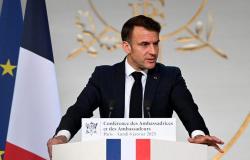France began the year 2025 without a budget after the fall of Michel Barnier's government, but with a special law allowing the state to continue to function. In the coming weeks, the Ministers of the Economy, Eric Lombard, and of Public Accounts, Amélie de Montchalin, will have the difficult task of leading discussions to provide the country with a budget. A challenge at a time when the economic context is very uncertain in France and around the world. The National Institute of Statistics and Economic Studies (Insee) and the Banque de France predict growth “morose” and a rise in the unemployment rate in 2025, in the unprecedented context of political instability and slippage in public finances. Only the slowdown in inflation constitutes good news.
Slow growth
In its economic report dated December, INSEE anticipates a timid start to the year for the French economy, with growth in gross domestic product (GDP) of 0.2% per quarter in the first half of 2025. “The signals emerging from household and business surveys paint a gloomy landscape”said Dorian Roucher, head of the economic department, during the presentation of INSEE forecasts.
For its part, the Banque de France calculated a forecast covering the entire year just before the censorship of Michel Barnier's government. In 2025, growth would be 0.9%, or 0.3 points less than in its previous forecasts published in September. And 0.2 points less than the 1.1% recorded in 2023 and 2024, a year marked by the Olympics effect. A downward revision due in part to “uncertainty at the international level”.
According to Anne-Sophie Alsif, economist at BDO France, the protectionist policy of Donald Trump, who wants to increase customs duties, could have “a very unfavorable impact on the euro zone”, particularly on Germany and to a lesser extent on France. A report from the Center for Prospective Studies and International Information (PDF) predicts that France will see “its exports fall by 0.5% and its GDP by 0.1%” with the coming to power of the far-right billionaire.
“There are geopolitical risks [avec l’élection de Donald Trump]but what is central is the crisis in France. 2025 was supposed to be a year of recovery, which is hampered by the political context.”
Anne-Sophie Alsif, economistat franceinfo
If the various economic players anticipate a slowdown in foreign trade and a freeze in private investment, they do, however, anticipate an increase in household consumption. Alone “the consumer would bear some of the growth”with an increase of 0.1% then 0.3% in its expenditure at the start of the year, predicts INSEE. The institute also underlines that the savings rate of the French, which stands at 18.2% of gross disposable income in 2024, a record level, “could reduce a little, as long as the period of political uncertainty ends”. “We are not in a recession scenario, rather low growth”concludes Mathieu Plane, deputy director of the Analysis and Forecasts department of the French Observatory of Economic Conditions (OFCE).
A reduced but excessive deficit
The situation of public finances still looks uncertain in 2025. The public deficit (the gap between tax revenues of administrations and their expenditure), which reached 5.5% of gross domestic product in 2023, has further increased. worsened in 2024. The Ministry of the Economy estimated, in November, that it would reach 6.1% of GDP, which would have the consequence of increasing the debt. This unprecedented situation forced Michel Barnier to present a 2025 budget in which he planned a budgetary effort of 60 billion euros (40 billion in savings by reducing spending and 20 billion in additional revenue).
Since then, the government has been censored and France is sailing without a budget. The new Prime Minister, François Bayrou, has not yet officially defined the deficit target for 2025, which will be included in the future budget. But he could slightly exceed the 5% mark which was set by his predecessor. Eric Lombard, the new Minister of the Economy, has outlined several avenues for containing the deficit: he has notably spoken out in favor of possible tax increases “very limited” and intends to achieve “additional savings”.
While an excessive deficit procedure has been opened by the European Commission – the 3% threshold has been set by the European Union – the Banque de France mentions “a deficit range of between 5% and 5.5%”an obviously uncertain modeling since no finance bill for 2025 has yet been presented. “It’s the most total blur, observe Mathieu Plane. Given the political fragmentation and censorship of Michel Barnier's government, it is difficult to imagine a consensus for a severe budgetary adjustment program.”
Inflation calming down
The various economic players, however, agree on good news: inflation will continue to slow down in 2025. INSEE expects inflation to be 1% in June 2025. For the year, the Banque de France predicts a figure of 1.6%, compared to around 2% for the year 2024. It would thus continue to decline significantly after the inflationary shock which followed the start of the war in Ukraine: the price increase had reached 5.2% in 2022 and 4.9% in 2023, according to INSEE. “This decline could be explained in particular by negative inflation in energy prices”underlines the Bank of France.
“This is certainly the best news for the entire economy.”
Mathieu Plane, economistat franceinfo
“We find moderate levels of inflationcontinues the deputy director of the OFCE's Analysis and Forecasts Department, and if prices increase, this puts less pressure on the purchasing power of households.” The expected drop in interest rates will also give households more leeway.
A rising unemployment rate
Currently at 7.4%, the unemployment rate in France should rise to 7.6% of the active population by mid-2025, according to INSEE. For its part, the Banque de France expects a rate of job seekers of 7.8% in 2025 and observes that “the labor market is showing signs of weakening, after having been surprisingly dynamic since the pandemic (1.1 million net job creations since the end of 2019)”.
Several factors are put forward to explain this rise in unemployment: sluggish growth, the recovery of productivity (which had fallen during Covid-19) and public policies less favorable to employment. The finance bill from Michel Barnier's government (from which François Bayrou should largely draw inspiration) notably provided for a reduction in the apprenticeship bonus and a reduction in exemptions from social security contributions.
The concrete effects of this situation are already visible, with business failures and social plans multiplying. “By mid-2025, the private sector would begin to destroy salaried positions, particularly apprentices, and employment should slow down significantly in the public sector,” writes INSEE. The institute estimates that job creation would not compensate “the increase in the active population”particularly under the effect of the entry into force of the pension reform which raised the retirement age from 62 to 64 years. Furthermore, its economic report does not take into consideration the effects on employment of any budgetary restrictions that could be taken.






